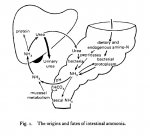How does OKG work?
Researchers are still scratching their heads trying to figure out how OKG works. They have observed that the two components of OKG are precursors to glutamate, which can be converted to glutamine. Glutamine plays a role in regulating protein metabolism. Ornithine is used by the body to make arginine, proline and the polyamines such as putrescine, spermine and spermidine. These
play a role in successfully helping cells reproduce and helping to repair wounds. Ornithine is also a component of the urea cycle. Researchers also think that OKG decreases protein breakdown and the markers of protein degradation such as in burn injuries. They suspect that it might stimulate the release of insulin and growth hormone. And lastly; researchers report that the effects seen with OKG are seen when both ornithine and alpha-ketoglutarate are present together but not when they are used separately.
2
OKG has been studied in both human and animal models and has been shown to be beneficial in several conditions including trauma and compromised health conditions
http://www.smart-publications.com/a...tarate-OKG-promotes-glutamine-and-muscle-mass

